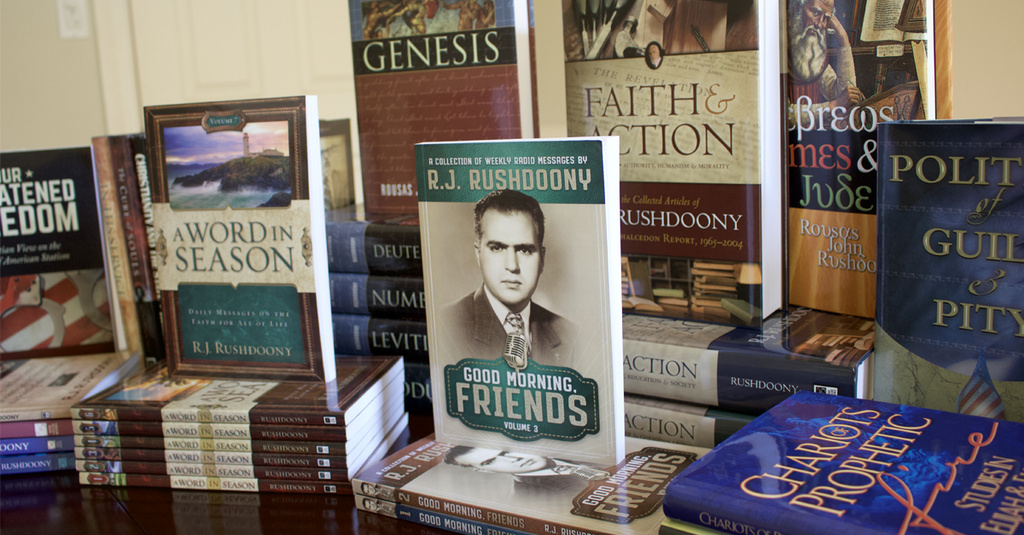
We’re Still Publishing Christian Reconstruction
Christian Reconstruction spread primarily because of books, and in the era of soundbytes, click bait, and social media influencing, it might seem odd that Chalcedon would remain dedicated to Christian publishing. Do Christians still read theological books?

- Chalcedon Editorial
Christian Reconstruction spread primarily because of books, and in the era of sound bytes, click bait, and social media influencing, it might seem odd that Chalcedon would remain dedicated to Christian publishing. Do Christians still read theological books?
Although Rushdoony was very much a scholar, he wanted to reach the thoughtful readers sitting in the pew because he saw them as the foot soldiers for Christ’s Kingdom. Rushdoony wanted to inspire Christians to faith and action, and that’s what he deemed as the purpose of theology.
Our Publishing Philosophy
However, as a ministry, we recognize the ever changing landscape of contemporary communications, but we do not feel that alters our mission of Christian education, so our commitment to publishing still consumes much of our effort as we are always working to bring volumes to press.
The work is tedious with many hands involved, but our goal is to publish and preserve the writings of R. J. Rushdoony—and others—in both print and digital formats that make these works more accessible and usable than ever before.
Some of our recent book projects were new, some of the books are reprints, and others are new compilations and collections from previous works that were less than user friendly.
For example, the Legacy Collection featuring An Informed Faith: The Position Papers of R. J. Rushdoony (3 vols), Faith and Action: The Collected Articles of R. J. Rushdoony from the Chalcedon Report, 1965-2004 (3 vols), and Faith + Wellness: Resisting the State Control of Healthcare by Restoring the Priestly Calling of Doctors are a republishing of the contents of Roots of Reconstruction (1,100+ pages)—along with some additional articles—in a more accessible and usable format featuring extensive indices that were not available in Roots of Reconstruction.
By making the content of Roots of Reconstruction easier to access for research and study, we are helping readers to dive even deeper into Rushdoony’s thought, and we believe this will only benefit the Kingdom of God.
Undoing the Darkness
Other book titles were slotted for republishing because we finally sold out of the original printing which provided us the opportunity to make corrections to the text as well as update the design of the book.
One such example is To Be As God: A Study of Modern Thought Since the Marquis de Sade which was recently sent to press after much needed corrections to the text by Chalcedon scholar, Martin Selbrede. We took advantage of this opportunity to also design a new cover and inside pages.
The book represents some of the last writings of R. J. Rushdoony, but it covers topics he spoke of often. He clearly saw the destructive power of modern thought since the Enlightenment because it was a reaction to the Reformation’s theocentricity. Rushdoony began with the Marquis de Sade because the Frenchman was a forerunner of modern thought. Until today, de Sade may have seemed a strange choice by Rushdoony, but we now see how deeply perversion is embedded and celebrated in contemporary culture. A book like this is needed now more than ever, so we’re delighted to release this revised edition.
The Minor Prophets
Because Rushdoony felt his calling was to move men to faith and action (see his introduction in Systematic Theology in Two Volumes), his approach was bent towards equipping believers to apply their faith in effective Christian Reconstruction. Therefore, even his Biblical commentaries were not technical volumes but rather mined for their usefulness in revealing God’s sovereign purpose and His call to action. Because of this expository approach, commentaries like Rushdoony’s treatment of Leviticus and Numbers make for enlightening reading!
That’s why we’re excited to mention that we’re very close to going to press with Rushdoony’s Sermons in Zephaniah, Haggai and Zechariah.
As with his other commentaries, Rushdoony brings life to these otherwise obscure Old Testament texts that help us to clearly see the ongoing war between the Kingdom of God and humanistic man. This volume is a potent and sobering commentary that you’re sure to want to read. Stay tuned for more updates.
Godly Social Order
A long-awaited book nearing completion is Rushdoony’s I & II Corinthians, a commentary on these two important Pauline letters which Rushdoony penned from his sermon series Godly Social Order which he preached from 1998-2000.
This sizable volume (over 400 pages with indices) is a welcomed addition to Rushdoony’s studies of the New Testament, and its thrust demonstrates the true purpose of the church as the embassy of Christ called to establish a godly social order:
The church was thus the called out people of the cosmic emperor, Jesus Christ, whose responsibility it was to apply God’s law and government to a given area. These early Christians were the advance guard of a people who were to bring everything into submission to Christ. This was to be done by conversion, not coercion. The church at Corinth had the responsibility to begin the conversion of all the peoples, families, institutions, arts, sciences, agencies, and all things else to Jesus Christ.1
For Rushdoony, everything came back to the victory of God in history,
and during a time of social and political unrest, this commentary is
sure to be a great encouragement. We hope to have this available before
year’s end.
Rebirth of Government
We’re also close to publishing a new edition of a powerful classic Christianity and the State as a paperback, which will feature a new, more extensive index as well as a redesign of the cover and inside pages.
Christian Reconstruction is often viewed as a political movement, and a great reason for that is because Christians themselves have a view of the state that’s similar to their secular counterparts, and a good many conservative Christians saw hope in politics.
Granted, this does not mean a Christian should not be politically active, but it does mean the church should be informed about the nature of government and work “towards the rebirth of government” (the title of one of the last chapters of this book).
Funds In Hand
There are more publishing projects in the works, such as a biography/history of R. J. Rushdoony written by Mark Rushdoony, and we’ll have more to share about them as they progress. Our hope is that you’ll continue to see the importance of publishing as a central part of our mission of Christian education.
Remember, it’s your financial support that makes all of this happen, and as Martin Selbrede noted in his Foreword to Rushdoony’s I & II Corinthians:
Dr. Rushdoony insisted upon a zero debt policy for the Chalcedon Foundation, which meant he had to choose what to publish first based on funds actually in hand.2
1. R. J. Rushdoony, <em>I & II Corinthians</em>, p. 2 (forthcoming). 2. ibid., p. viii.

- Chalcedon Editorial